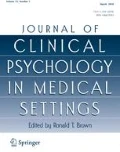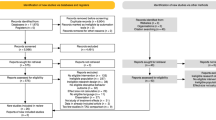Abstract
Parent reported behavioral difficulties in young children are relatively common. Without adequate intervention, some children will later present with more severe problem behaviors. Parent management training is one of the best methods of treatment for behavior problems; however, existing treatments can be lengthy and difficult to conduct outside of a research setting. The Brief Behavioral Intervention was designed as a briefer version of a manualized parent management training treatment package. Thirty-one parents of children aged 2–6.5 presenting with behavior problems were included in this initial study of treatment effectiveness. Based on parent and teacher report, treatment was effective in a mean of 7.2 sessions.


Similar content being viewed by others
References
Barkley, R. A., & Benton, C. M. (1998). Your defiant child. New York: Guilford Press.
Briggs-Gowan, M. J., Carter, A. S., Bosson-Heenan, J., Guyer, A. E., & Horwitz, (2006). Are infant-toddler social-emotional and behavioral problems transient? Journal of the American Academy of Child and Adolescent Psychiatry, 45, 849–858. doi:10.1097/01.chi.0000220849.48650.59.
Demmler, J. (1998). Utilization of specialty mental health organizations by older adults: US national profile. Psychiatric Services (Washington, D.C.), 49, 1079–1081.
Durlak, J. A., & Wells, A. M. (1997). Primary prevention mental health programs for children and adolescents: A meta-analytic review. American Journal of Community Psychology, 25, 115–152.
Egeland, B., Kalkoske, M., Gottesman, N., & Erickson, M. (1990). Preschool behavior problems: Stability and factors accounting for change. Journal of Child Psychology and Psychiatry and Allied Disciplines, 31, 891–910.
Evidence Based Services Committee 2004 Biennial Report. Hawaii Department of Health. Summary of effective interventions for youth with behavioral and emotional needs. Retrieved May 6, 2007 from http://hawaii.gov/health/mental-health/camhd/library/pdf/ebs/ebs011.pdf.
Eyberg, S. M. (1988). Parent-child interaction therapy: Integration of traditional and behavioral concerns. Child and Family Behavior Therapy, 10, 33–46. doi:10.1300/J019v10n01_04.
Eyberg, S. (1999). Eyberg Child Behavior Inventory. Lutz, FL: PAR, Inc.
Eyberg, S., Nelson, M. M., & Boggs, S. R. (2008). Evidenced-based psychosocial treatments for children and adolescents with disruptive behavior. Journal of Child and Adolescent Psychology, 37, 215–237. doi:10.1080/15374410701820117.
Eyberg, S., & Pincus, (1999). ECBI, SESBI-R professional manual. Lutz, FL: PAR, Inc.
Eyberg, S., & Sutter, J. (1999). Sutter–Eyberg Student Behavior Inventory–Revised. Lutz, FL: PAR, Inc.
Fernandez, M. A., & Eyberg, S. M. (2005). Keeping families in once they’ve come through the door: Attrition in parent-child interaction therapy. Journal of Early and Intensive Behavior Intervention, 2, 207–212.
Hooks, M. Y., Mayes, L. C., & Volkmar, F. R. (1998). Psychiatric disorders among preschool children. Journal of the American Academy of Child and Adolescent Psychiatry, 27, 623–627.
Kazdin, A. E. (1995). Conduct disorder in childhood and adolescence (2nd ed.). Thousand Oaks, CA: Sage.
Kazdin, A. E. (2003). Problem solving skills training and parent management training for conduct disorder. In A. E. Kazdin & J. R. Weisz (Eds.), Evidence-based psychotherapy for children and adolescents (pp. 241–262). New York: Oxford University Press.
Kazdin, A. E., & Weisz, J. (1998). Identifying and developing empirically supported child and adolescent treatments. Journal of Consulting and Clinical Psychology, 66, 19–36. doi:10.1037/0022-006X.66.1.19.
Kelleher, K. J., McInerny, T. K., Gardner, W. P., Childs, G. E., & Wasserman, R. C. (2000). Increasing identification of psychosocial problems: 1979–1996. Pediatrics, 105, 1313–1378. doi:10.1542/peds.105.6.1313.
Kessler, R. C., Berglund, P., Demler, O., Jin, R., Merikangas, K. R., & Walters, E. E. (2005). Lifetime prevalence and age-of-onset distributions of DSM-IV disorders in the national comorbidity survey replication. Archives of General Psychiatry, 62, 617–627. doi:10.1001/archpsyc.62.6.617.
Lavigne, J. V., Gibbons, R. D., Christoffel, K. K., Arend, R., Roenbaum, D., Binns, H., et al. (1996). Prevalence rates and correlates of psychiatric disorders among preschool children. Journal of the American Academy of Child and Adolescent Psychiatry, 35, 204–214. doi:10.1097/00004583-199602000-00014.
Lochman, J. E., & Wells, K. C. (2003). Effectiveness study of coping power and classroom intervention with aggressive children: Outcomes at a one-year follow-up. Behavior Therapy, 34, 493–515. doi:10.1016/S0005-7894(03)80032-1.
McMahon, R. J., & Forehand, R. L. (2003). Helping the noncompliant child: Family-based treatment for oppositional behavior. New York: Guilford Press.
Mesman, J., & Koot, H. M. (2001). Early preschool predictors of preadolescent internalizing and externalizing DSM-IV diagnoses. Journal of the American Academy of Child and Adolescent Psychiatry, 40, 1029–1036. doi:10.1097/00004583-200109000-00011.
Moffitt, T., & Caspi, A. (2001). Childhood predictors differentiate life-course persistent and adolescence-limited antisocial pathways among males and females. Development and Psychopathology, 13, 355–375. doi:10.1017/S0954579401002097.
O’Brien, M. (1996). Child-rearing difficulties reported by parents of infants and toddlers. Journal of Pediatric Psychology, 21, 433–446. doi:10.1093/jpepsy/21.3.433.
O’Leary, S. (1995). Parental discipline mistakes. Current Directions in Psychological Science, 4, 11–13. doi:10.1111/1467-8721.ep10770944.
Patterson, G. R., Reid, J. B., & Dishion, T. J. (1992). Antisocial boys (Vol. 4). Eugene, OR: Castalia Publishing Company.
Qi, H., & Kaiser, A. (2003). Behavior problems of preschool children from low income families: Review of the literature. Topics in Early Childhood Special Education, 23, 188–216. doi:10.1177/02711214030230040201.
Reynolds, C. R., & Kamphaus, R. W. (2004). Behavioral Assessment System for Children (BASC-2). Circle Pines, MN: AGS Publishing.
Ringel, J. S., & Sturm, R. (2001). National estimates of mental health utilization and expenditures for children in 1998. Journal of Behavioral Health Services and Research, 28, 319–333. doi:10.1007/BF02287247.
Schoenwald, S. K., Kelleher, K., & Weisz, J. R. (2008). Building bridges to evidence-based practice: The MacArthur Foundation child system and treatment enhancement projects. Administration and Policy in Mental Health and Mental Health Services Research, 35, 66–72. doi:10.1007/s10488-007-0160-9.
Snyder, J., & Stoolmiller, M. (2002). Reinforcement and coercion mechanisms in the development of antisocial behavior: The family. In J. B. Reid, G. R. Patterson, & J. Snyder (Eds.), Antisocial behavior in children and adolescents: A developmental analysis and model for intervention (pp. 65–100). Washington, DC: American Psychological Association.
Sprafkin, J., & Gadow, K. D. (1996). Early Childhood Inventories manual. StonyBrook, NY: Checkmate Plus.
Sprague, J., & Walker, H. (2000). Early identification and intervention for youth with antisocial and violent behavior. Exceptional Children, 66, 367–379.
Tremblay, R. E., Pagani-Kurtz, L., Masse, L. C., Vitaro, F., & Phil, R. (1995). A bimodal preventive intervention for disruptive kindergarten boys: Its impact through mid-adolescence. Journal of Consulting and Clinical Psychology, 63, 560–568. doi:10.1037/0022-006X.63.4.560.
Webster-Stratton, C. (1984). Randomized trial of two parent-training programs for families with conduct-disordered children. Journal of Consulting and Clinical Psychology, 52, 666–678. doi:10.1037/0022-006X.52.4.666.
Webster-Stratton, C. (1996). Early-onset conduct problems: Does gender make a difference? Journal of Consulting and Clinical Psychology, 64, 540–551. doi:10.1037/0022-006X.64.3.540.
Wierson, M., & Forehand, R. (1994). Parent behavioral training for child noncompliance: Rationale, concepts, and effectiveness. Current Directions in Psychological Science, 3, 146–149. doi:10.1111/1467-8721.ep10770643.
Zito, J. (2002). Five burning questions. Journal of Developmental and Behavioral Pediatrics, 23(Suppl. 1), s23–s30.
Author information
Authors and Affiliations
Corresponding author
Rights and permissions
About this article
Cite this article
Axelrad, M.E., Garland, B.H. & Love, K.B. Brief Behavioral Intervention for Young Children with Disruptive Behaviors. J Clin Psychol Med Settings 16, 263–269 (2009). https://doi.org/10.1007/s10880-009-9166-7
Received:
Accepted:
Published:
Issue Date:
DOI: https://doi.org/10.1007/s10880-009-9166-7




